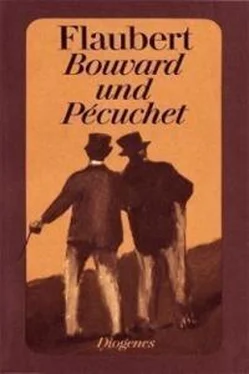For want of dumbbells, the wheelwright turned out four pieces of ash resembling sugar–loaves with necks of bottles at the ends. These should be carried to the right and to the left, to the front and to the back; but being too heavy they fell out of their hands, at the risk of bruising their legs. No matter! They set their hearts on Persian clubs, and even fearing lest they might break, they rubbed them every evening with wax and a piece of cloth.
Then they looked out for ditches. When they found one suitable for their purpose, they rested a long pole in the centre, sprang forward on the left foot, reached the opposite side, and then repeated the performance. The country being flat, they could be seen at a distance; and the villagers asked one another what were these extraordinary things skipping towards the horizon.
When autumn arrived they went in for chamber gymnastics, which completely bored them. Why had they not the indoor apparatus or post–armchair invented in Louis XIV.'s time by the Abbé of St. Pierre? How was it made? Where could they get the information?
Dumouchel did not deign to answer their letter on the subject.
Then they erected in the bakehouse a brachial weighing–machine. Over two pulleys attached to the ceiling a rope was passed, holding a crossbeam at each end. As soon as they had caught hold of it one pushed against the ground with his toes, while the other lowered his arms to a level with the floor; the first by his weight would draw towards him the second, who, slackening his rope a little, would ascend in his turn. In less than five minutes their limbs were dripping with perspiration.
In order to follow the prescriptions of the Manual, they tried to make themselves ambidextrous, even to the extent of depriving themselves for a time of the use of their right hands. They did more: Amoros points out certain snatches of verse which ought to be sung during the manoeuvres, and Bouvard and Pécuchet, as they proceeded, kept repeating the hymn No. 9: "A king, a just king is a blessing on earth."
When they beat their breast–bones: "Friends, the crown and the glory," etc.
At the various steps of the race:
"Let us catch the beast that cowers!
Soon the swift stag shall be ours!
Yes! the race shall soon be won,
Come, run! come, run! come, run!" [17] A nous l'animal timide! Atteignons le cerf rapide! Oui! nous vaincons! Courons! courons! courons!
And, panting more than hounds, they cheered each other on with the sounds of their voices.
One side of gymnastics excited their enthusiasm—its employment as a means of saving life. But they would have required children in order to learn how to carry them in sacks, and they begged the schoolmaster to furnish them with some. Petit objected that their families would be annoyed at it. They fell back on the succour of the wounded. One pretended to have swooned: the other rolled him away in a wheelbarrow with the utmost precaution.
As for military escalades, the author extols the ladder of Bois–Rosé, so called from the captain who surprised Fécamp in former days by climbing up the cliff.
In accordance with the engraving in the book, they trimmed a rope with little sticks and fixed it under the cart–shed. As soon as the first stick is bestridden and the third grasped, the limbs are thrown out in order that the second, which a moment before was against the chest, might be directly under the thighs. The climber then springs up and grasps the fourth, and so goes on.
In spite of prodigious strainings of the hips, they found it impossible to reach the second step. Perhaps there is less trouble in hanging on to stones with your hands, just as Bonaparte's soldiers did at the attack of Fort Chambray? and to make one capable of such an action, Amoros has a tower in his establishment.
The wall in ruins might do as a substitute for it. They attempted the assault with it. But Bouvard, having withdrawn his foot too quickly from a hole, got frightened, and was seized with dizziness.
Pécuchet blamed their method for it. They had neglected that which relates to the phalanxes, so that they should go back to first principles.
His exhortations were fruitless; and then, in his pride and presumption, he went in for stilts.
Nature seemed to have destined him for them, for he immediately made use of the great model with flat boards four feet from the ground, and, balanced thereon, he stalked over the garden like a gigantic stork taking exercise.
Bouvard, at the window, saw him stagger and then flop down all of a heap over the kidney–beans, whose props, giving way as he descended, broke his fall.
He was picked up covered with mould, his nostrils bleeding—livid; and he fancied that he had strained himself.
Decidedly, gymnastics did not agree with men of their age. They abandoned them, did not venture to move about any longer for fear of accidents, and they remained the whole day sitting in the museum dreaming of other occupations.
This change of habits had an influence on Bouvard's health. He became very heavy, puffed like a whale after his meals, tried to make himself thin, ate less, and began to grow weak.
Pécuchet, in like manner, felt himself "undermined," had itchings in his skin and lumps in his throat.
"This won't do," said they; "this won't do."
Bouvard thought of going to select at the inn some bottles of Spanish wine in order to put his bodily machinery in order.
As he was going out, Marescot's clerk and three men brought from Beljambe a large walnut table. "Monsieur" was much obliged to him for it. It had been conveyed in perfect order.
Bouvard in this way learned about the new fashion of table–turning. He joked about it with the clerk.
However, all over Europe, America, Australia and the Indies, millions of mortals passed their lives in making tables turn; and they discovered the way to make prophets of canaries, to give concerts without instruments, and to correspond by means of snails. The press, seriously offering these impostures to the public, increased its credulity.
The spirit–rappers had alighted at the château of Faverges, and thence had spread through the village; and the notary questioned them particularly.
Shocked at Bouvard's scepticism, he invited the two friends to an evening party at table–turning.
Was this a trap? Madame Bordin was to be there. Pécuchet went alone.
There were present as spectators the mayor, the tax–collector, the captain, other residents and their wives, Madame Vaucorbeil, Madame Bordin, of course, besides Mademoiselle Laverrière, Madame Marescot's former schoolmistress, a rather squint–eyed lady with her hair falling over her shoulders in the corkscrew fashion of 1830. In an armchair sat a cousin from Paris, attired in a blue coat and wearing an air of insolence.
The two bronze lamps, the whatnot containing a number of curiosities, ballads embellished with vignettes on the piano, and small water–colours in huge frames, had always excited astonishment in Chavignolles. But this evening all eyes were directed towards the mahogany table. They would test it by and by, and it had the importance of things which contain a mystery. A dozen guests took their places around it with outstretched hands and their little fingers touching one another. Only the ticking of the clock could be heard. The faces indicated profound attention. At the end of ten minutes several complained of tinglings in the arms.
Pécuchet was incommoded.
"You are pushing!" said the captain to Foureau.
"Not at all."
"Yes, you are!"
"Ah! sir."
The notary made them keep quiet.
By dint of straining their ears they thought they could distinguish cracklings of wood.
An illusion! Nothing had budged.
Читать дальше








![Гюстав Флобер - Закат Карфагена [Сборник]](/books/414440/gyustav-flober-zakat-karfagena-sbornik-thumb.webp)


